UEL Psychology: Research Ethics Application on Domestic Abuse Rehab
VerifiedAdded on 2023/01/06
|19
|5250
|40
Homework Assignment
AI Summary
This document is an application for research ethics approval submitted by a psychology student at UEL for a BSc research project. The study aims to explore rehabilitation theories for domestic abuse offenders in the UK. The research employs a qualitative inductive design, involving interviews with selected authorities from 20 rehabilitation centers. The application details the research questions, methodology, participant recruitment, data collection (primarily through online questionnaires), and data analysis (thematic analysis). It also addresses confidentiality and security measures, including anonymous data gathering, password-protected files, and data retention for a minimum of 10 years. The application confirms that the participant information letter includes details about the research, voluntary participation, potential risks and advantages, right to withdraw, data confidentiality, and contact information. A risk assessment indicates no physical or psychological risks to the researcher. The research does not involve working with children or vulnerable adults, and no external ethical clearances are needed. The application adheres to the British Psychological Society’s Code of Ethics and Conduct and the UEL Code of Practice for Research Ethics.
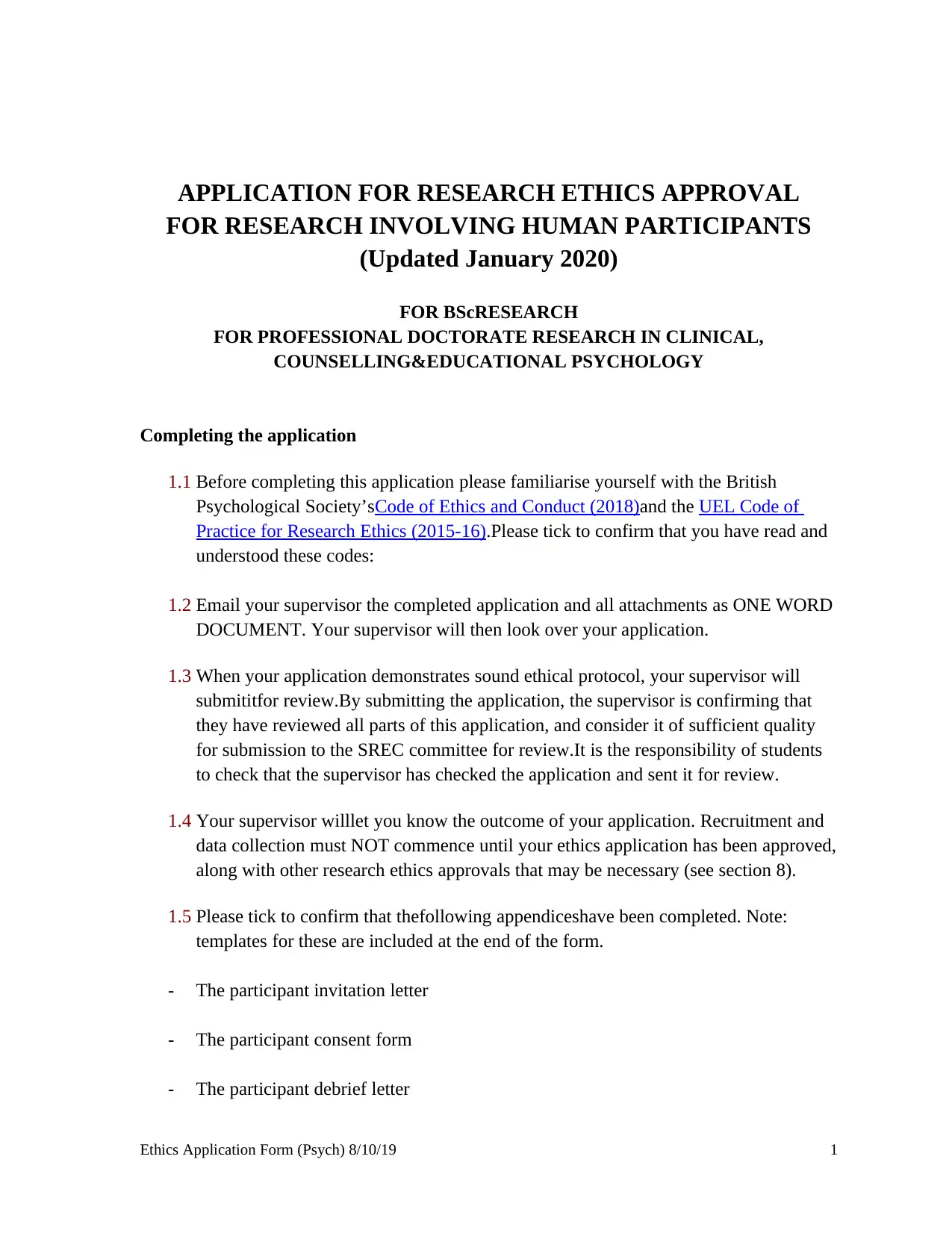
APPLICATION FOR RESEARCH ETHICS APPROVAL
FOR RESEARCH INVOLVING HUMAN PARTICIPANTS
(Updated January 2020)
FOR BScRESEARCH
FOR PROFESSIONAL DOCTORATE RESEARCH IN CLINICAL,
COUNSELLING&EDUCATIONAL PSYCHOLOGY
Completing the application
1.1 Before completing this application please familiarise yourself with the British
Psychological Society’sCode of Ethics and Conduct (2018)and the UEL Code of
Practice for Research Ethics (2015-16).Please tick to confirm that you have read and
understood these codes:
1.2 Email your supervisor the completed application and all attachments as ONE WORD
DOCUMENT. Your supervisor will then look over your application.
1.3 When your application demonstrates sound ethical protocol, your supervisor will
submititfor review.By submitting the application, the supervisor is confirming that
they have reviewed all parts of this application, and consider it of sufficient quality
for submission to the SREC committee for review.It is the responsibility of students
to check that the supervisor has checked the application and sent it for review.
1.4 Your supervisor willlet you know the outcome of your application. Recruitment and
data collection must NOT commence until your ethics application has been approved,
along with other research ethics approvals that may be necessary (see section 8).
1.5 Please tick to confirm that thefollowing appendiceshave been completed. Note:
templates for these are included at the end of the form.
- The participant invitation letter
- The participant consent form
- The participant debrief letter
Ethics Application Form (Psych) 8/10/19 1
FOR RESEARCH INVOLVING HUMAN PARTICIPANTS
(Updated January 2020)
FOR BScRESEARCH
FOR PROFESSIONAL DOCTORATE RESEARCH IN CLINICAL,
COUNSELLING&EDUCATIONAL PSYCHOLOGY
Completing the application
1.1 Before completing this application please familiarise yourself with the British
Psychological Society’sCode of Ethics and Conduct (2018)and the UEL Code of
Practice for Research Ethics (2015-16).Please tick to confirm that you have read and
understood these codes:
1.2 Email your supervisor the completed application and all attachments as ONE WORD
DOCUMENT. Your supervisor will then look over your application.
1.3 When your application demonstrates sound ethical protocol, your supervisor will
submititfor review.By submitting the application, the supervisor is confirming that
they have reviewed all parts of this application, and consider it of sufficient quality
for submission to the SREC committee for review.It is the responsibility of students
to check that the supervisor has checked the application and sent it for review.
1.4 Your supervisor willlet you know the outcome of your application. Recruitment and
data collection must NOT commence until your ethics application has been approved,
along with other research ethics approvals that may be necessary (see section 8).
1.5 Please tick to confirm that thefollowing appendiceshave been completed. Note:
templates for these are included at the end of the form.
- The participant invitation letter
- The participant consent form
- The participant debrief letter
Ethics Application Form (Psych) 8/10/19 1
Paraphrase This Document
Need a fresh take? Get an instant paraphrase of this document with our AI Paraphraser
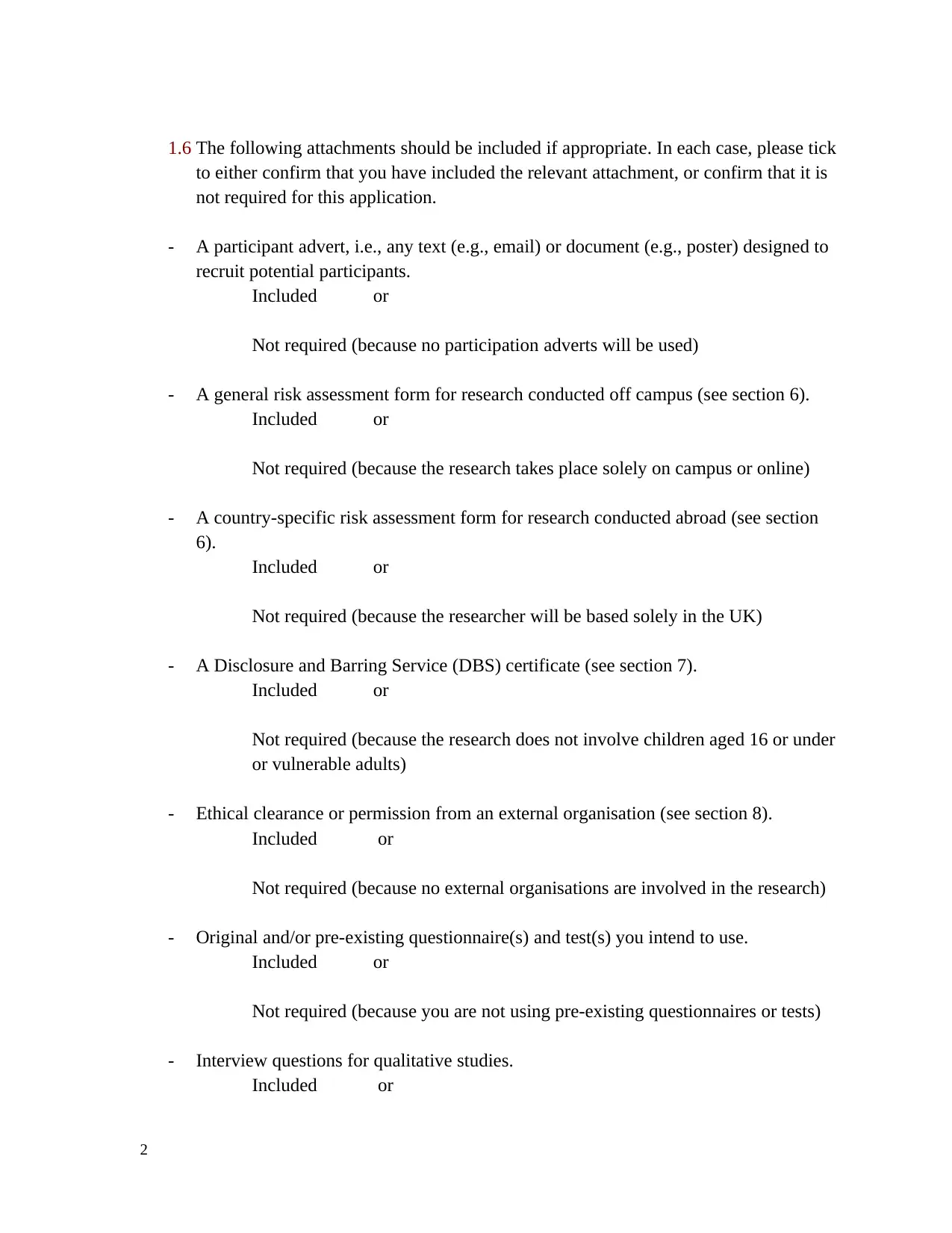
1.6 The following attachments should be included if appropriate. In each case, please tick
to either confirm that you have included the relevant attachment, or confirm that it is
not required for this application.
- A participant advert, i.e., any text (e.g., email) or document (e.g., poster) designed to
recruit potential participants.
Included or
Not required (because no participation adverts will be used)
- A general risk assessment form for research conducted off campus (see section 6).
Included or
Not required (because the research takes place solely on campus or online)
- A country-specific risk assessment form for research conducted abroad (see section
6).
Included or
Not required (because the researcher will be based solely in the UK)
- A Disclosure and Barring Service (DBS) certificate (see section 7).
Included or
Not required (because the research does not involve children aged 16 or under
or vulnerable adults)
- Ethical clearance or permission from an external organisation (see section 8).
Included or
Not required (because no external organisations are involved in the research)
- Original and/or pre-existing questionnaire(s) and test(s) you intend to use.
Included or
Not required (because you are not using pre-existing questionnaires or tests)
- Interview questions for qualitative studies.
Included or
2
to either confirm that you have included the relevant attachment, or confirm that it is
not required for this application.
- A participant advert, i.e., any text (e.g., email) or document (e.g., poster) designed to
recruit potential participants.
Included or
Not required (because no participation adverts will be used)
- A general risk assessment form for research conducted off campus (see section 6).
Included or
Not required (because the research takes place solely on campus or online)
- A country-specific risk assessment form for research conducted abroad (see section
6).
Included or
Not required (because the researcher will be based solely in the UK)
- A Disclosure and Barring Service (DBS) certificate (see section 7).
Included or
Not required (because the research does not involve children aged 16 or under
or vulnerable adults)
- Ethical clearance or permission from an external organisation (see section 8).
Included or
Not required (because no external organisations are involved in the research)
- Original and/or pre-existing questionnaire(s) and test(s) you intend to use.
Included or
Not required (because you are not using pre-existing questionnaires or tests)
- Interview questions for qualitative studies.
Included or
2
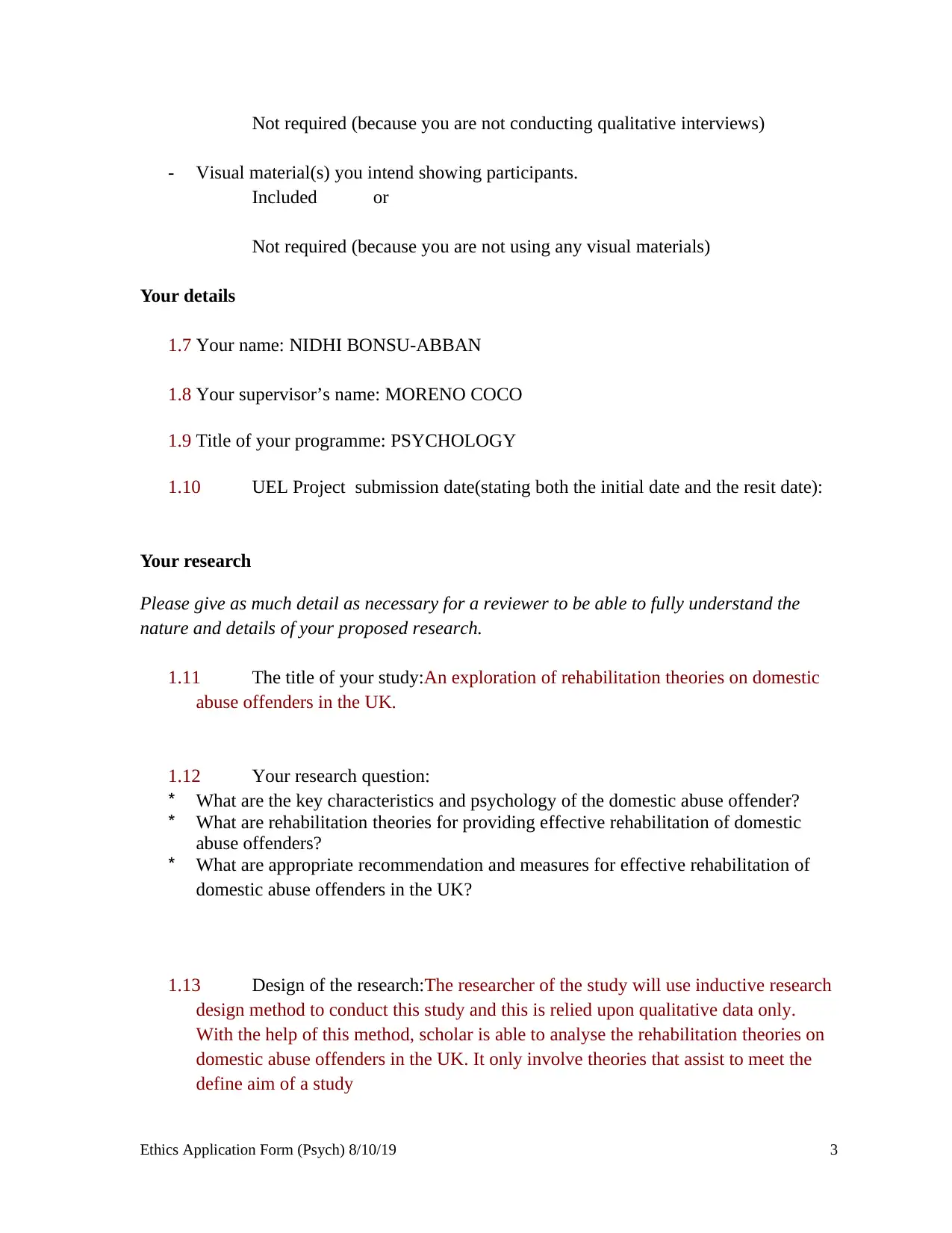
Not required (because you are not conducting qualitative interviews)
- Visual material(s) you intend showing participants.
Included or
Not required (because you are not using any visual materials)
Your details
1.7 Your name: NIDHI BONSU-ABBAN
1.8 Your supervisor’s name: MORENO COCO
1.9 Title of your programme: PSYCHOLOGY
1.10 UEL Project submission date(stating both the initial date and the resit date):
Your research
Please give as much detail as necessary for a reviewer to be able to fully understand the
nature and details of your proposed research.
1.11 The title of your study:An exploration of rehabilitation theories on domestic
abuse offenders in the UK.
1.12 Your research question:
* What are the key characteristics and psychology of the domestic abuse offender?
* What are rehabilitation theories for providing effective rehabilitation of domestic
abuse offenders?
* What are appropriate recommendation and measures for effective rehabilitation of
domestic abuse offenders in the UK?
1.13 Design of the research:The researcher of the study will use inductive research
design method to conduct this study and this is relied upon qualitative data only.
With the help of this method, scholar is able to analyse the rehabilitation theories on
domestic abuse offenders in the UK. It only involve theories that assist to meet the
define aim of a study
Ethics Application Form (Psych) 8/10/19 3
- Visual material(s) you intend showing participants.
Included or
Not required (because you are not using any visual materials)
Your details
1.7 Your name: NIDHI BONSU-ABBAN
1.8 Your supervisor’s name: MORENO COCO
1.9 Title of your programme: PSYCHOLOGY
1.10 UEL Project submission date(stating both the initial date and the resit date):
Your research
Please give as much detail as necessary for a reviewer to be able to fully understand the
nature and details of your proposed research.
1.11 The title of your study:An exploration of rehabilitation theories on domestic
abuse offenders in the UK.
1.12 Your research question:
* What are the key characteristics and psychology of the domestic abuse offender?
* What are rehabilitation theories for providing effective rehabilitation of domestic
abuse offenders?
* What are appropriate recommendation and measures for effective rehabilitation of
domestic abuse offenders in the UK?
1.13 Design of the research:The researcher of the study will use inductive research
design method to conduct this study and this is relied upon qualitative data only.
With the help of this method, scholar is able to analyse the rehabilitation theories on
domestic abuse offenders in the UK. It only involve theories that assist to meet the
define aim of a study
Ethics Application Form (Psych) 8/10/19 3
⊘ This is a preview!⊘
Do you want full access?
Subscribe today to unlock all pages.

Trusted by 1+ million students worldwide
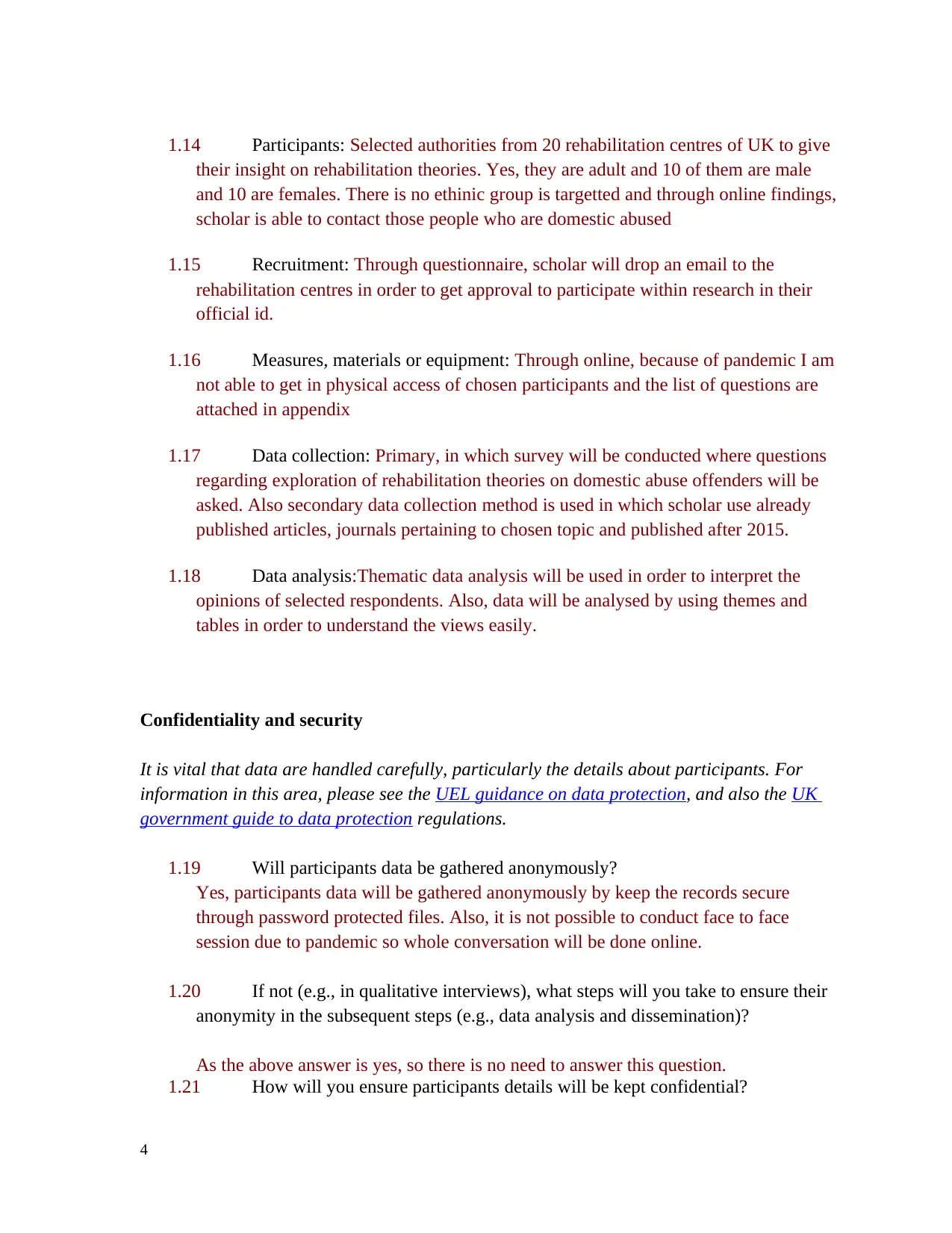
1.14 Participants: Selected authorities from 20 rehabilitation centres of UK to give
their insight on rehabilitation theories. Yes, they are adult and 10 of them are male
and 10 are females. There is no ethinic group is targetted and through online findings,
scholar is able to contact those people who are domestic abused
1.15 Recruitment: Through questionnaire, scholar will drop an email to the
rehabilitation centres in order to get approval to participate within research in their
official id.
1.16 Measures, materials or equipment: Through online, because of pandemic I am
not able to get in physical access of chosen participants and the list of questions are
attached in appendix
1.17 Data collection: Primary, in which survey will be conducted where questions
regarding exploration of rehabilitation theories on domestic abuse offenders will be
asked. Also secondary data collection method is used in which scholar use already
published articles, journals pertaining to chosen topic and published after 2015.
1.18 Data analysis:Thematic data analysis will be used in order to interpret the
opinions of selected respondents. Also, data will be analysed by using themes and
tables in order to understand the views easily.
Confidentiality and security
It is vital that data are handled carefully, particularly the details about participants. For
information in this area, please see the UEL guidance on data protection, and also the UK
government guide to data protection regulations.
1.19 Will participants data be gathered anonymously?
Yes, participants data will be gathered anonymously by keep the records secure
through password protected files. Also, it is not possible to conduct face to face
session due to pandemic so whole conversation will be done online.
1.20 If not (e.g., in qualitative interviews), what steps will you take to ensure their
anonymity in the subsequent steps (e.g., data analysis and dissemination)?
As the above answer is yes, so there is no need to answer this question.
1.21 How will you ensure participants details will be kept confidential?
4
their insight on rehabilitation theories. Yes, they are adult and 10 of them are male
and 10 are females. There is no ethinic group is targetted and through online findings,
scholar is able to contact those people who are domestic abused
1.15 Recruitment: Through questionnaire, scholar will drop an email to the
rehabilitation centres in order to get approval to participate within research in their
official id.
1.16 Measures, materials or equipment: Through online, because of pandemic I am
not able to get in physical access of chosen participants and the list of questions are
attached in appendix
1.17 Data collection: Primary, in which survey will be conducted where questions
regarding exploration of rehabilitation theories on domestic abuse offenders will be
asked. Also secondary data collection method is used in which scholar use already
published articles, journals pertaining to chosen topic and published after 2015.
1.18 Data analysis:Thematic data analysis will be used in order to interpret the
opinions of selected respondents. Also, data will be analysed by using themes and
tables in order to understand the views easily.
Confidentiality and security
It is vital that data are handled carefully, particularly the details about participants. For
information in this area, please see the UEL guidance on data protection, and also the UK
government guide to data protection regulations.
1.19 Will participants data be gathered anonymously?
Yes, participants data will be gathered anonymously by keep the records secure
through password protected files. Also, it is not possible to conduct face to face
session due to pandemic so whole conversation will be done online.
1.20 If not (e.g., in qualitative interviews), what steps will you take to ensure their
anonymity in the subsequent steps (e.g., data analysis and dissemination)?
As the above answer is yes, so there is no need to answer this question.
1.21 How will you ensure participants details will be kept confidential?
4
Paraphrase This Document
Need a fresh take? Get an instant paraphrase of this document with our AI Paraphraser
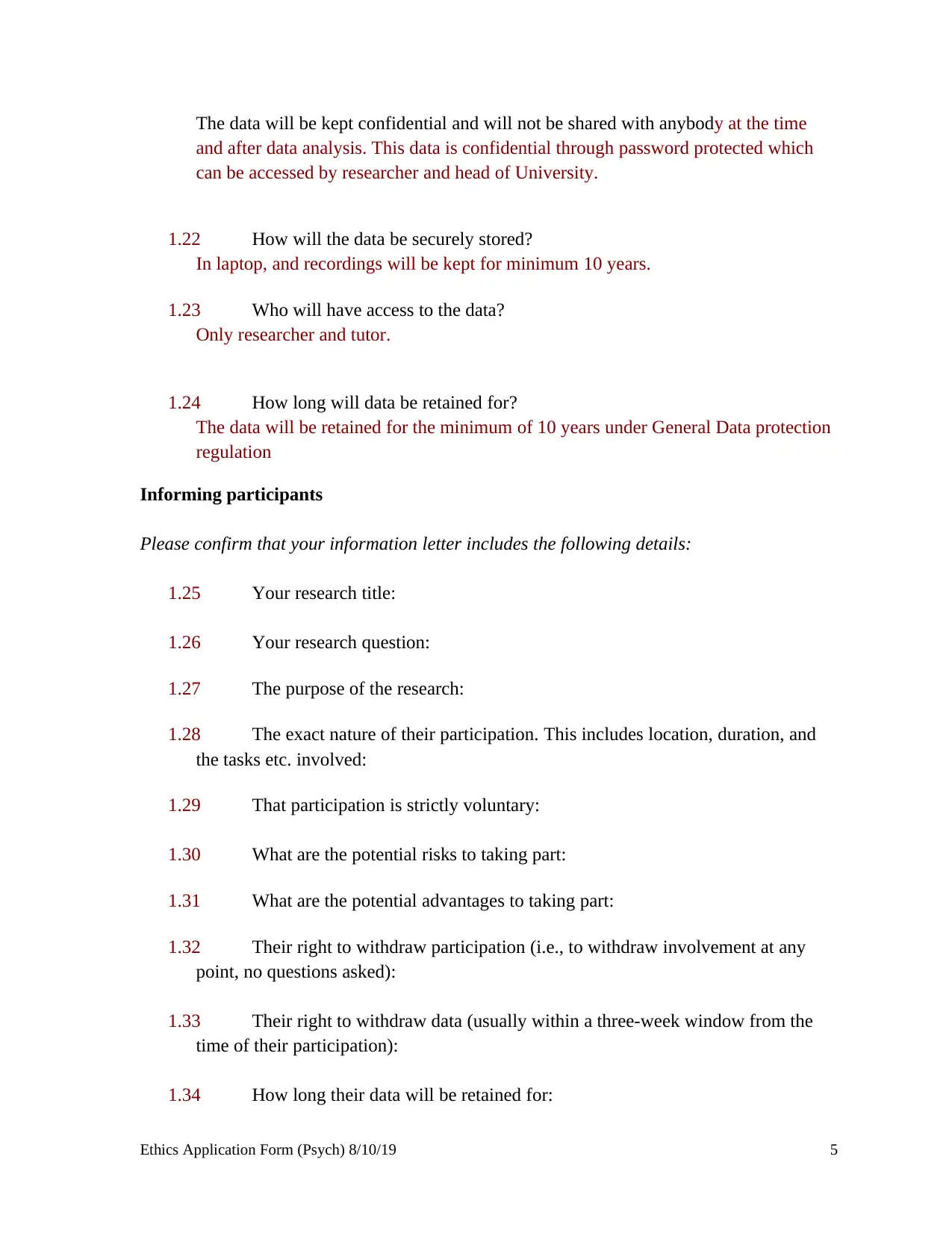
The data will be kept confidential and will not be shared with anybody at the time
and after data analysis. This data is confidential through password protected which
can be accessed by researcher and head of University.
1.22 How will the data be securely stored?
In laptop, and recordings will be kept for minimum 10 years.
1.23 Who will have access to the data?
Only researcher and tutor.
1.24 How long will data be retained for?
The data will be retained for the minimum of 10 years under General Data protection
regulation
Informing participants
Please confirm that your information letter includes the following details:
1.25 Your research title:
1.26 Your research question:
1.27 The purpose of the research:
1.28 The exact nature of their participation. This includes location, duration, and
the tasks etc. involved:
1.29 That participation is strictly voluntary:
1.30 What are the potential risks to taking part:
1.31 What are the potential advantages to taking part:
1.32 Their right to withdraw participation (i.e., to withdraw involvement at any
point, no questions asked):
1.33 Their right to withdraw data (usually within a three-week window from the
time of their participation):
1.34 How long their data will be retained for:
Ethics Application Form (Psych) 8/10/19 5
and after data analysis. This data is confidential through password protected which
can be accessed by researcher and head of University.
1.22 How will the data be securely stored?
In laptop, and recordings will be kept for minimum 10 years.
1.23 Who will have access to the data?
Only researcher and tutor.
1.24 How long will data be retained for?
The data will be retained for the minimum of 10 years under General Data protection
regulation
Informing participants
Please confirm that your information letter includes the following details:
1.25 Your research title:
1.26 Your research question:
1.27 The purpose of the research:
1.28 The exact nature of their participation. This includes location, duration, and
the tasks etc. involved:
1.29 That participation is strictly voluntary:
1.30 What are the potential risks to taking part:
1.31 What are the potential advantages to taking part:
1.32 Their right to withdraw participation (i.e., to withdraw involvement at any
point, no questions asked):
1.33 Their right to withdraw data (usually within a three-week window from the
time of their participation):
1.34 How long their data will be retained for:
Ethics Application Form (Psych) 8/10/19 5

1.35 How their information will be kept confidential:
1.36 How their data will be securely stored:
1.37 What will happen to the results/analysis:
1.38 Your UEL contact details:
1.39 The UEL contact details of your supervisor:
Pleasealsoconfirm whether:
1.40 Are you engaging in deception? If so, what will participants be told about the
nature of the research, and how will you inform them about its real nature.
NO
1.41 Will the data be gathered anonymously?If NO, what steps will be taken to
ensure confidentiality and protect the identity of participants?
No, to ensure about confidentiality, scholar will save identify of participants through
password which cannot be accessed by anyone without approval.
Yes, participants data will be gathered anonymously
1.42 Will participants be paid or reimbursed?If so, this must be in the form of
redeemable vouchers, not cash. If yes, why is it necessary and how much will it be
worth?
NO
Risk Assessment
Please note: If you have serious concerns about the safety of a participant, or others, during
the course of your research please see your supervisor as soon as possible.If there is any
unexpected occurrence while you are collecting your data (e.g. a participant or the
researcher injures themselves), please report this to your supervisor as soon as possible.
1.43 Are there any potential physical or psychological risks to participants related
to taking part? If so, what are these, and how can they be minimised?
6
1.36 How their data will be securely stored:
1.37 What will happen to the results/analysis:
1.38 Your UEL contact details:
1.39 The UEL contact details of your supervisor:
Pleasealsoconfirm whether:
1.40 Are you engaging in deception? If so, what will participants be told about the
nature of the research, and how will you inform them about its real nature.
NO
1.41 Will the data be gathered anonymously?If NO, what steps will be taken to
ensure confidentiality and protect the identity of participants?
No, to ensure about confidentiality, scholar will save identify of participants through
password which cannot be accessed by anyone without approval.
Yes, participants data will be gathered anonymously
1.42 Will participants be paid or reimbursed?If so, this must be in the form of
redeemable vouchers, not cash. If yes, why is it necessary and how much will it be
worth?
NO
Risk Assessment
Please note: If you have serious concerns about the safety of a participant, or others, during
the course of your research please see your supervisor as soon as possible.If there is any
unexpected occurrence while you are collecting your data (e.g. a participant or the
researcher injures themselves), please report this to your supervisor as soon as possible.
1.43 Are there any potential physical or psychological risks to participants related
to taking part? If so, what are these, and how can they be minimised?
6
⊘ This is a preview!⊘
Do you want full access?
Subscribe today to unlock all pages.

Trusted by 1+ million students worldwide
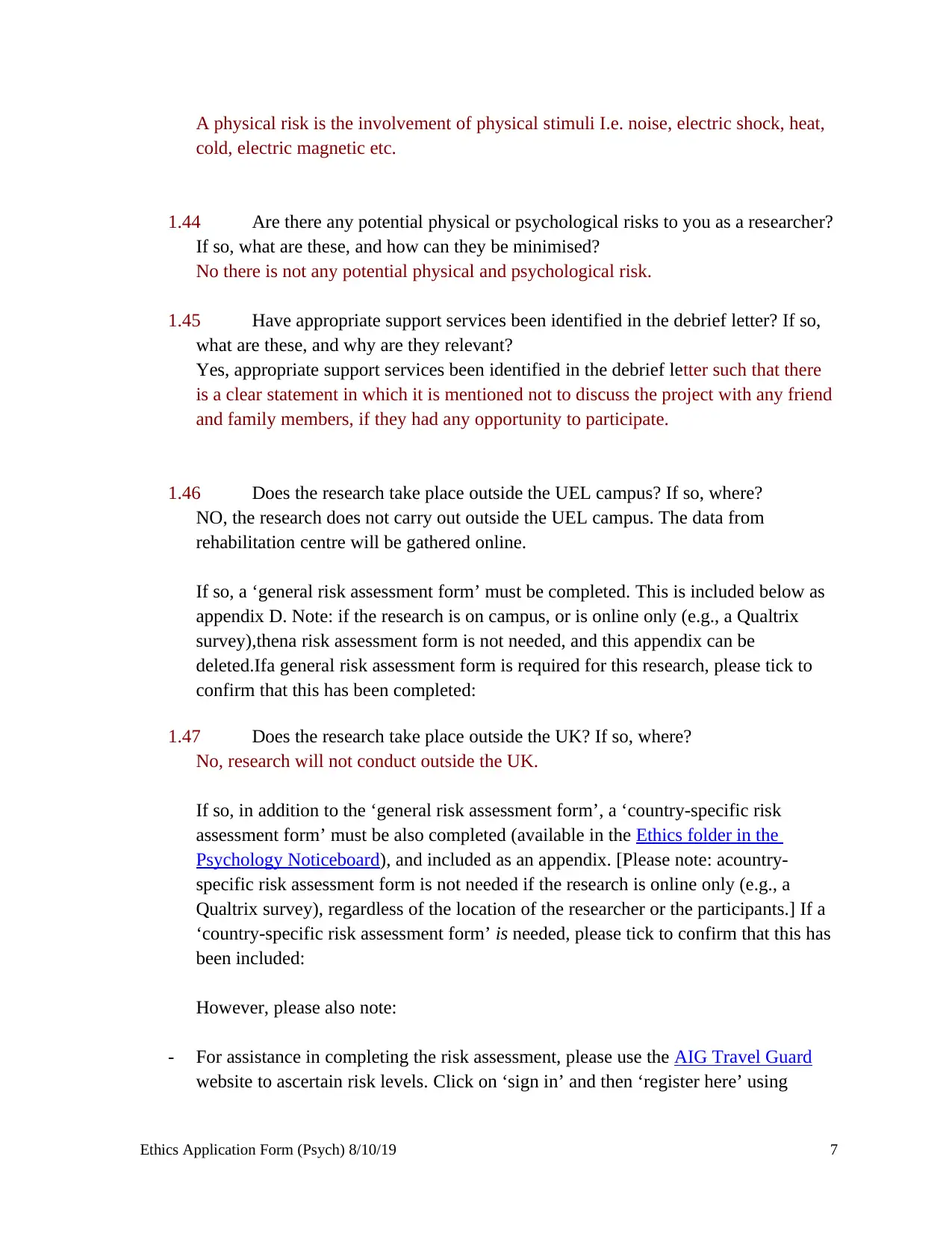
A physical risk is the involvement of physical stimuli I.e. noise, electric shock, heat,
cold, electric magnetic etc.
1.44 Are there any potential physical or psychological risks to you as a researcher?
If so, what are these, and how can they be minimised?
No there is not any potential physical and psychological risk.
1.45 Have appropriate support services been identified in the debrief letter? If so,
what are these, and why are they relevant?
Yes, appropriate support services been identified in the debrief letter such that there
is a clear statement in which it is mentioned not to discuss the project with any friend
and family members, if they had any opportunity to participate.
1.46 Does the research take place outside the UEL campus? If so, where?
NO, the research does not carry out outside the UEL campus. The data from
rehabilitation centre will be gathered online.
If so, a ‘general risk assessment form’ must be completed. This is included below as
appendix D. Note: if the research is on campus, or is online only (e.g., a Qualtrix
survey),thena risk assessment form is not needed, and this appendix can be
deleted.Ifa general risk assessment form is required for this research, please tick to
confirm that this has been completed:
1.47 Does the research take place outside the UK? If so, where?
No, research will not conduct outside the UK.
If so, in addition to the ‘general risk assessment form’, a ‘country-specific risk
assessment form’ must be also completed (available in the Ethics folder in the
Psychology Noticeboard), and included as an appendix. [Please note: acountry-
specific risk assessment form is not needed if the research is online only (e.g., a
Qualtrix survey), regardless of the location of the researcher or the participants.] If a
‘country-specific risk assessment form’ is needed, please tick to confirm that this has
been included:
However, please also note:
- For assistance in completing the risk assessment, please use the AIG Travel Guard
website to ascertain risk levels. Click on ‘sign in’ and then ‘register here’ using
Ethics Application Form (Psych) 8/10/19 7
cold, electric magnetic etc.
1.44 Are there any potential physical or psychological risks to you as a researcher?
If so, what are these, and how can they be minimised?
No there is not any potential physical and psychological risk.
1.45 Have appropriate support services been identified in the debrief letter? If so,
what are these, and why are they relevant?
Yes, appropriate support services been identified in the debrief letter such that there
is a clear statement in which it is mentioned not to discuss the project with any friend
and family members, if they had any opportunity to participate.
1.46 Does the research take place outside the UEL campus? If so, where?
NO, the research does not carry out outside the UEL campus. The data from
rehabilitation centre will be gathered online.
If so, a ‘general risk assessment form’ must be completed. This is included below as
appendix D. Note: if the research is on campus, or is online only (e.g., a Qualtrix
survey),thena risk assessment form is not needed, and this appendix can be
deleted.Ifa general risk assessment form is required for this research, please tick to
confirm that this has been completed:
1.47 Does the research take place outside the UK? If so, where?
No, research will not conduct outside the UK.
If so, in addition to the ‘general risk assessment form’, a ‘country-specific risk
assessment form’ must be also completed (available in the Ethics folder in the
Psychology Noticeboard), and included as an appendix. [Please note: acountry-
specific risk assessment form is not needed if the research is online only (e.g., a
Qualtrix survey), regardless of the location of the researcher or the participants.] If a
‘country-specific risk assessment form’ is needed, please tick to confirm that this has
been included:
However, please also note:
- For assistance in completing the risk assessment, please use the AIG Travel Guard
website to ascertain risk levels. Click on ‘sign in’ and then ‘register here’ using
Ethics Application Form (Psych) 8/10/19 7
Paraphrase This Document
Need a fresh take? Get an instant paraphrase of this document with our AI Paraphraser
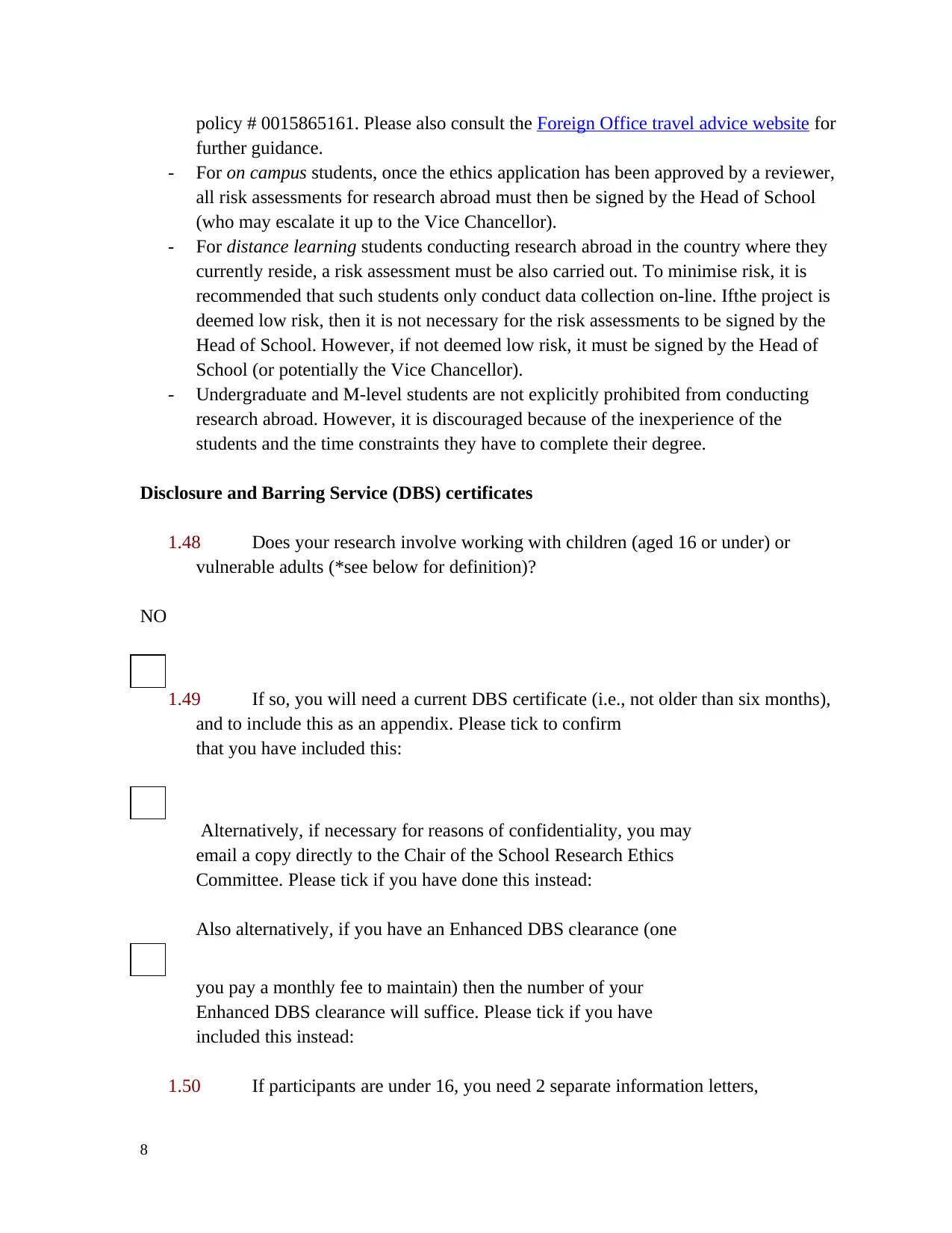
policy # 0015865161. Please also consult the Foreign Office travel advice website for
further guidance.
- For on campus students, once the ethics application has been approved by a reviewer,
all risk assessments for research abroad must then be signed by the Head of School
(who may escalate it up to the Vice Chancellor).
- For distance learning students conducting research abroad in the country where they
currently reside, a risk assessment must be also carried out. To minimise risk, it is
recommended that such students only conduct data collection on-line. Ifthe project is
deemed low risk, then it is not necessary for the risk assessments to be signed by the
Head of School. However, if not deemed low risk, it must be signed by the Head of
School (or potentially the Vice Chancellor).
- Undergraduate and M-level students are not explicitly prohibited from conducting
research abroad. However, it is discouraged because of the inexperience of the
students and the time constraints they have to complete their degree.
Disclosure and Barring Service (DBS) certificates
1.48 Does your research involve working with children (aged 16 or under) or
vulnerable adults (*see below for definition)?
NO
1.49 If so, you will need a current DBS certificate (i.e., not older than six months),
and to include this as an appendix. Please tick to confirm
that you have included this:
Alternatively, if necessary for reasons of confidentiality, you may
email a copy directly to the Chair of the School Research Ethics
Committee. Please tick if you have done this instead:
Also alternatively, if you have an Enhanced DBS clearance (one
you pay a monthly fee to maintain) then the number of your
Enhanced DBS clearance will suffice. Please tick if you have
included this instead:
1.50 If participants are under 16, you need 2 separate information letters,
8
further guidance.
- For on campus students, once the ethics application has been approved by a reviewer,
all risk assessments for research abroad must then be signed by the Head of School
(who may escalate it up to the Vice Chancellor).
- For distance learning students conducting research abroad in the country where they
currently reside, a risk assessment must be also carried out. To minimise risk, it is
recommended that such students only conduct data collection on-line. Ifthe project is
deemed low risk, then it is not necessary for the risk assessments to be signed by the
Head of School. However, if not deemed low risk, it must be signed by the Head of
School (or potentially the Vice Chancellor).
- Undergraduate and M-level students are not explicitly prohibited from conducting
research abroad. However, it is discouraged because of the inexperience of the
students and the time constraints they have to complete their degree.
Disclosure and Barring Service (DBS) certificates
1.48 Does your research involve working with children (aged 16 or under) or
vulnerable adults (*see below for definition)?
NO
1.49 If so, you will need a current DBS certificate (i.e., not older than six months),
and to include this as an appendix. Please tick to confirm
that you have included this:
Alternatively, if necessary for reasons of confidentiality, you may
email a copy directly to the Chair of the School Research Ethics
Committee. Please tick if you have done this instead:
Also alternatively, if you have an Enhanced DBS clearance (one
you pay a monthly fee to maintain) then the number of your
Enhanced DBS clearance will suffice. Please tick if you have
included this instead:
1.50 If participants are under 16, you need 2 separate information letters,
8
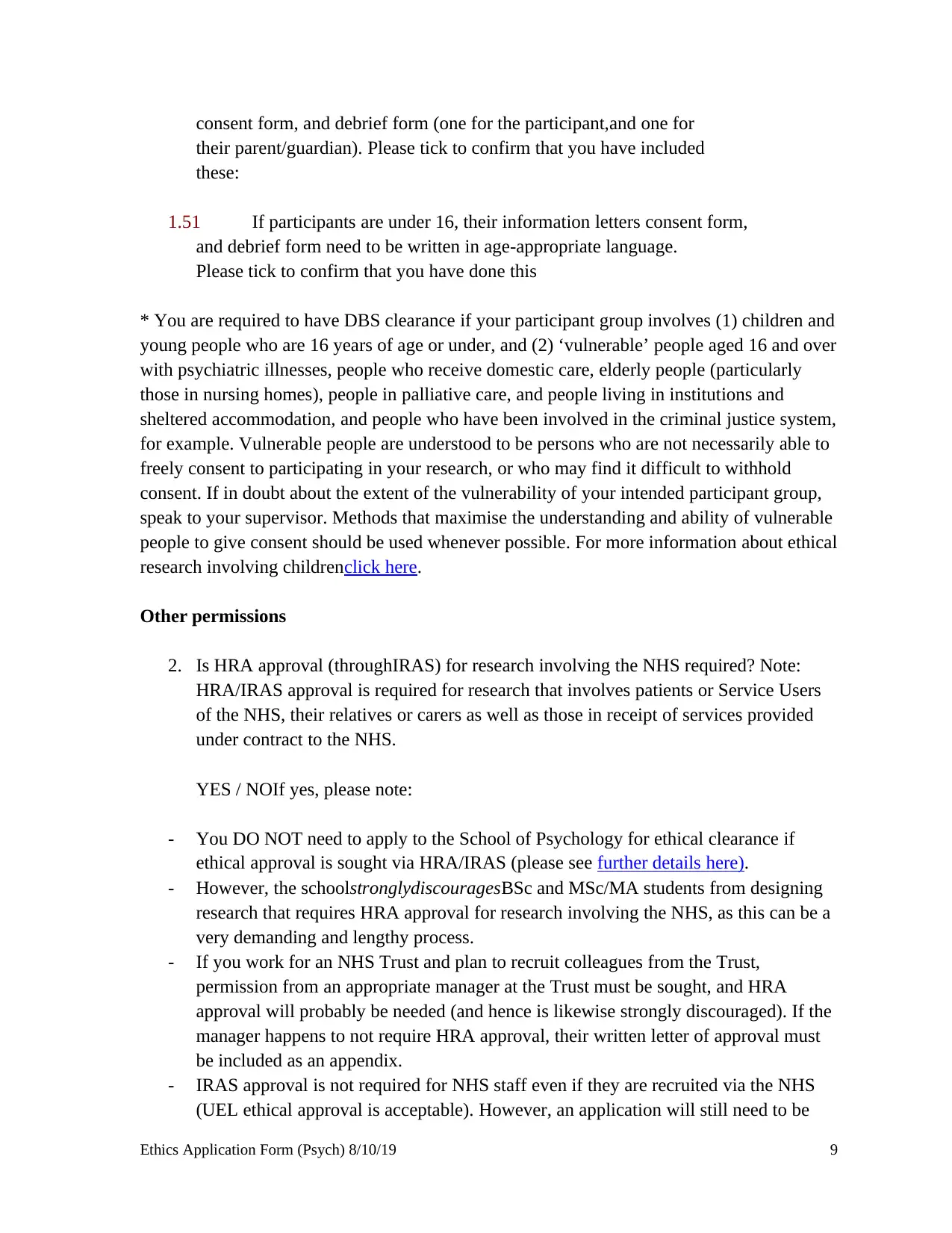
consent form, and debrief form (one for the participant,and one for
their parent/guardian). Please tick to confirm that you have included
these:
1.51 If participants are under 16, their information letters consent form,
and debrief form need to be written in age-appropriate language.
Please tick to confirm that you have done this
* You are required to have DBS clearance if your participant group involves (1) children and
young people who are 16 years of age or under, and (2) ‘vulnerable’ people aged 16 and over
with psychiatric illnesses, people who receive domestic care, elderly people (particularly
those in nursing homes), people in palliative care, and people living in institutions and
sheltered accommodation, and people who have been involved in the criminal justice system,
for example. Vulnerable people are understood to be persons who are not necessarily able to
freely consent to participating in your research, or who may find it difficult to withhold
consent. If in doubt about the extent of the vulnerability of your intended participant group,
speak to your supervisor. Methods that maximise the understanding and ability of vulnerable
people to give consent should be used whenever possible. For more information about ethical
research involving childrenclick here.
Other permissions
2. Is HRA approval (throughIRAS) for research involving the NHS required? Note:
HRA/IRAS approval is required for research that involves patients or Service Users
of the NHS, their relatives or carers as well as those in receipt of services provided
under contract to the NHS.
YES / NOIf yes, please note:
- You DO NOT need to apply to the School of Psychology for ethical clearance if
ethical approval is sought via HRA/IRAS (please see further details here).
- However, the schoolstronglydiscouragesBSc and MSc/MA students from designing
research that requires HRA approval for research involving the NHS, as this can be a
very demanding and lengthy process.
- If you work for an NHS Trust and plan to recruit colleagues from the Trust,
permission from an appropriate manager at the Trust must be sought, and HRA
approval will probably be needed (and hence is likewise strongly discouraged). If the
manager happens to not require HRA approval, their written letter of approval must
be included as an appendix.
- IRAS approval is not required for NHS staff even if they are recruited via the NHS
(UEL ethical approval is acceptable). However, an application will still need to be
Ethics Application Form (Psych) 8/10/19 9
their parent/guardian). Please tick to confirm that you have included
these:
1.51 If participants are under 16, their information letters consent form,
and debrief form need to be written in age-appropriate language.
Please tick to confirm that you have done this
* You are required to have DBS clearance if your participant group involves (1) children and
young people who are 16 years of age or under, and (2) ‘vulnerable’ people aged 16 and over
with psychiatric illnesses, people who receive domestic care, elderly people (particularly
those in nursing homes), people in palliative care, and people living in institutions and
sheltered accommodation, and people who have been involved in the criminal justice system,
for example. Vulnerable people are understood to be persons who are not necessarily able to
freely consent to participating in your research, or who may find it difficult to withhold
consent. If in doubt about the extent of the vulnerability of your intended participant group,
speak to your supervisor. Methods that maximise the understanding and ability of vulnerable
people to give consent should be used whenever possible. For more information about ethical
research involving childrenclick here.
Other permissions
2. Is HRA approval (throughIRAS) for research involving the NHS required? Note:
HRA/IRAS approval is required for research that involves patients or Service Users
of the NHS, their relatives or carers as well as those in receipt of services provided
under contract to the NHS.
YES / NOIf yes, please note:
- You DO NOT need to apply to the School of Psychology for ethical clearance if
ethical approval is sought via HRA/IRAS (please see further details here).
- However, the schoolstronglydiscouragesBSc and MSc/MA students from designing
research that requires HRA approval for research involving the NHS, as this can be a
very demanding and lengthy process.
- If you work for an NHS Trust and plan to recruit colleagues from the Trust,
permission from an appropriate manager at the Trust must be sought, and HRA
approval will probably be needed (and hence is likewise strongly discouraged). If the
manager happens to not require HRA approval, their written letter of approval must
be included as an appendix.
- IRAS approval is not required for NHS staff even if they are recruited via the NHS
(UEL ethical approval is acceptable). However, an application will still need to be
Ethics Application Form (Psych) 8/10/19 9
⊘ This is a preview!⊘
Do you want full access?
Subscribe today to unlock all pages.

Trusted by 1+ million students worldwide
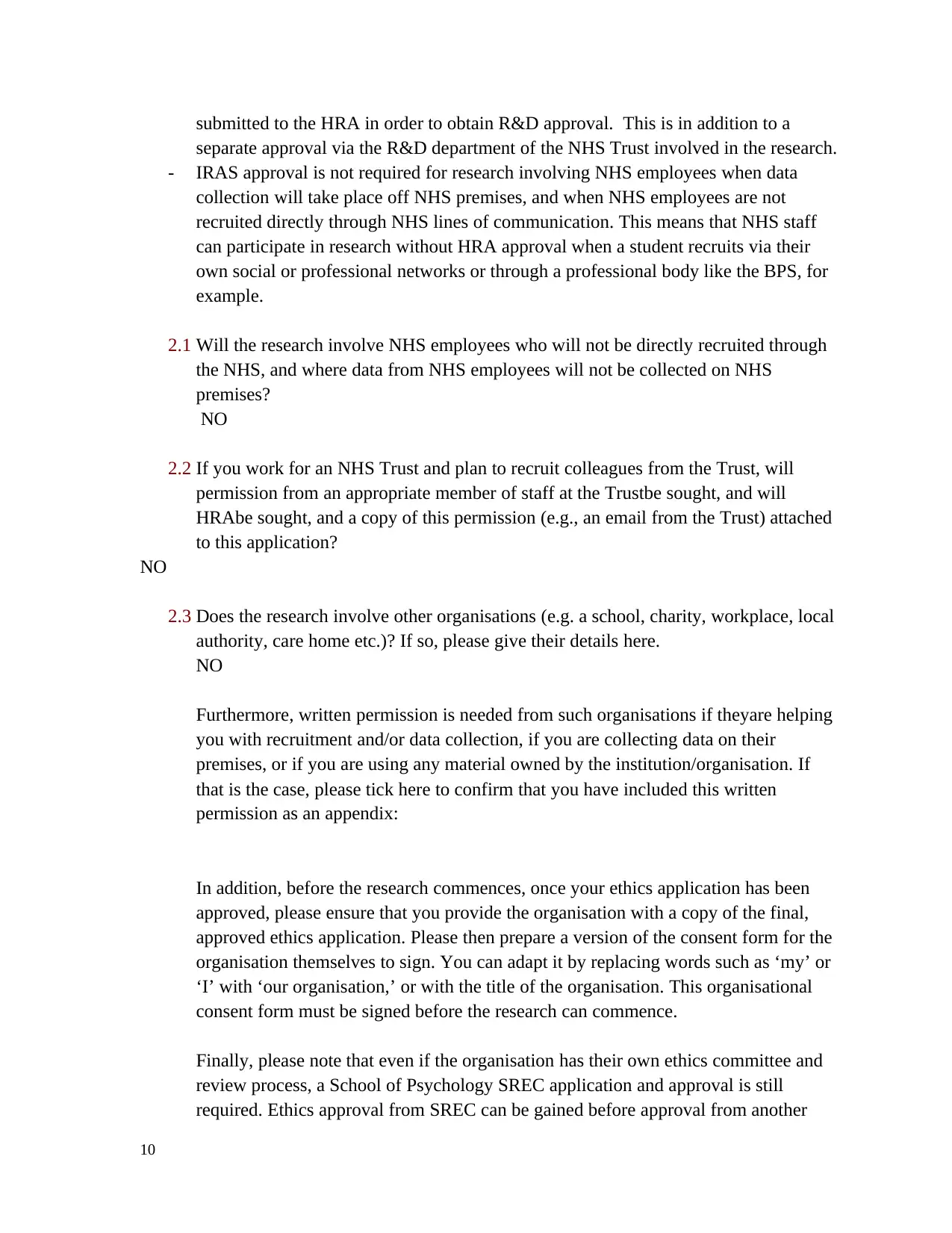
submitted to the HRA in order to obtain R&D approval. This is in addition to a
separate approval via the R&D department of the NHS Trust involved in the research.
- IRAS approval is not required for research involving NHS employees when data
collection will take place off NHS premises, and when NHS employees are not
recruited directly through NHS lines of communication. This means that NHS staff
can participate in research without HRA approval when a student recruits via their
own social or professional networks or through a professional body like the BPS, for
example.
2.1 Will the research involve NHS employees who will not be directly recruited through
the NHS, and where data from NHS employees will not be collected on NHS
premises?
NO
2.2 If you work for an NHS Trust and plan to recruit colleagues from the Trust, will
permission from an appropriate member of staff at the Trustbe sought, and will
HRAbe sought, and a copy of this permission (e.g., an email from the Trust) attached
to this application?
NO
2.3 Does the research involve other organisations (e.g. a school, charity, workplace, local
authority, care home etc.)? If so, please give their details here.
NO
Furthermore, written permission is needed from such organisations if theyare helping
you with recruitment and/or data collection, if you are collecting data on their
premises, or if you are using any material owned by the institution/organisation. If
that is the case, please tick here to confirm that you have included this written
permission as an appendix:
In addition, before the research commences, once your ethics application has been
approved, please ensure that you provide the organisation with a copy of the final,
approved ethics application. Please then prepare a version of the consent form for the
organisation themselves to sign. You can adapt it by replacing words such as ‘my’ or
‘I’ with ‘our organisation,’ or with the title of the organisation. This organisational
consent form must be signed before the research can commence.
Finally, please note that even if the organisation has their own ethics committee and
review process, a School of Psychology SREC application and approval is still
required. Ethics approval from SREC can be gained before approval from another
10
separate approval via the R&D department of the NHS Trust involved in the research.
- IRAS approval is not required for research involving NHS employees when data
collection will take place off NHS premises, and when NHS employees are not
recruited directly through NHS lines of communication. This means that NHS staff
can participate in research without HRA approval when a student recruits via their
own social or professional networks or through a professional body like the BPS, for
example.
2.1 Will the research involve NHS employees who will not be directly recruited through
the NHS, and where data from NHS employees will not be collected on NHS
premises?
NO
2.2 If you work for an NHS Trust and plan to recruit colleagues from the Trust, will
permission from an appropriate member of staff at the Trustbe sought, and will
HRAbe sought, and a copy of this permission (e.g., an email from the Trust) attached
to this application?
NO
2.3 Does the research involve other organisations (e.g. a school, charity, workplace, local
authority, care home etc.)? If so, please give their details here.
NO
Furthermore, written permission is needed from such organisations if theyare helping
you with recruitment and/or data collection, if you are collecting data on their
premises, or if you are using any material owned by the institution/organisation. If
that is the case, please tick here to confirm that you have included this written
permission as an appendix:
In addition, before the research commences, once your ethics application has been
approved, please ensure that you provide the organisation with a copy of the final,
approved ethics application. Please then prepare a version of the consent form for the
organisation themselves to sign. You can adapt it by replacing words such as ‘my’ or
‘I’ with ‘our organisation,’ or with the title of the organisation. This organisational
consent form must be signed before the research can commence.
Finally, please note that even if the organisation has their own ethics committee and
review process, a School of Psychology SREC application and approval is still
required. Ethics approval from SREC can be gained before approval from another
10
Paraphrase This Document
Need a fresh take? Get an instant paraphrase of this document with our AI Paraphraser
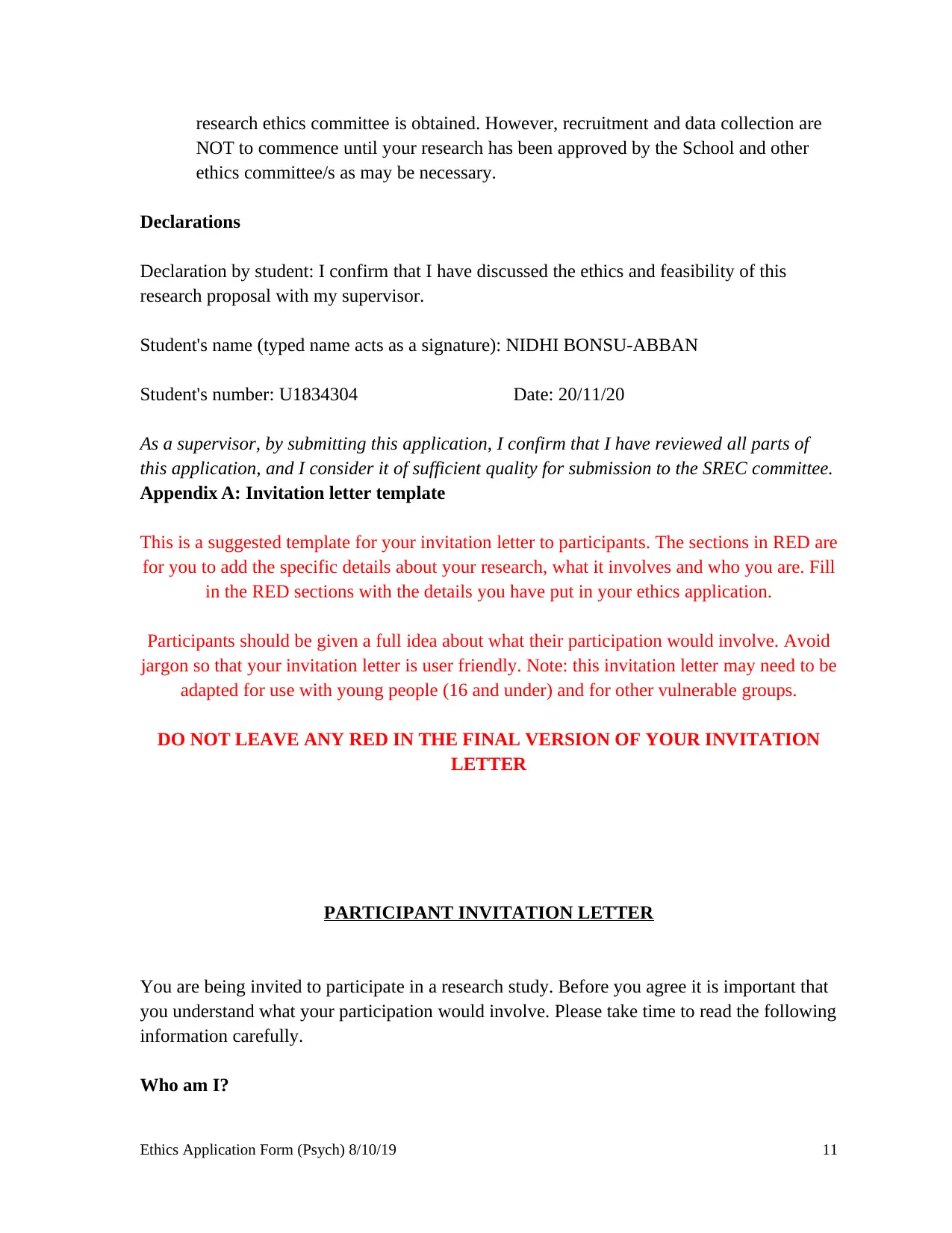
research ethics committee is obtained. However, recruitment and data collection are
NOT to commence until your research has been approved by the School and other
ethics committee/s as may be necessary.
Declarations
Declaration by student: I confirm that I have discussed the ethics and feasibility of this
research proposal with my supervisor.
Student's name (typed name acts as a signature): NIDHI BONSU-ABBAN
Student's number: U1834304 Date: 20/11/20
As a supervisor, by submitting this application, I confirm that I have reviewed all parts of
this application, and I consider it of sufficient quality for submission to the SREC committee.
Appendix A: Invitation letter template
This is a suggested template for your invitation letter to participants. The sections in RED are
for you to add the specific details about your research, what it involves and who you are. Fill
in the RED sections with the details you have put in your ethics application.
Participants should be given a full idea about what their participation would involve. Avoid
jargon so that your invitation letter is user friendly. Note: this invitation letter may need to be
adapted for use with young people (16 and under) and for other vulnerable groups.
DO NOT LEAVE ANY RED IN THE FINAL VERSION OF YOUR INVITATION
LETTER
PARTICIPANT INVITATION LETTER
You are being invited to participate in a research study. Before you agree it is important that
you understand what your participation would involve. Please take time to read the following
information carefully.
Who am I?
Ethics Application Form (Psych) 8/10/19 11
NOT to commence until your research has been approved by the School and other
ethics committee/s as may be necessary.
Declarations
Declaration by student: I confirm that I have discussed the ethics and feasibility of this
research proposal with my supervisor.
Student's name (typed name acts as a signature): NIDHI BONSU-ABBAN
Student's number: U1834304 Date: 20/11/20
As a supervisor, by submitting this application, I confirm that I have reviewed all parts of
this application, and I consider it of sufficient quality for submission to the SREC committee.
Appendix A: Invitation letter template
This is a suggested template for your invitation letter to participants. The sections in RED are
for you to add the specific details about your research, what it involves and who you are. Fill
in the RED sections with the details you have put in your ethics application.
Participants should be given a full idea about what their participation would involve. Avoid
jargon so that your invitation letter is user friendly. Note: this invitation letter may need to be
adapted for use with young people (16 and under) and for other vulnerable groups.
DO NOT LEAVE ANY RED IN THE FINAL VERSION OF YOUR INVITATION
LETTER
PARTICIPANT INVITATION LETTER
You are being invited to participate in a research study. Before you agree it is important that
you understand what your participation would involve. Please take time to read the following
information carefully.
Who am I?
Ethics Application Form (Psych) 8/10/19 11

I am a postgraduate student in the School of Psychology at the University of East London
and am studying for a psychology degree. As part of my studies I am conducting the research
you are being invited to participate in.
What is the research?
I am conducting research intoan exploration of rehabilitation theories for effective
rehabilitation of domestic abuse offenders in the UK.
My research has been approved by the School of Psychology Research Ethics Committee.
This means that the Committee’s evaluation of this ethics application has been guided by the
standards of research ethics set by the British Psychological Society.
Why have you been asked to participate?
You have been invited to participate in my research as someone who fits the kind of people I
am looking for to help me explore my research topic.
I am looking to involve in this research because I have an understanding in psychology and
can effectively explore information associated with rehabilitation theories for domestic abuse
offenders
I emphasise that I am not looking for ‘experts’ on the topic I am studying. You will not be
judged or personally analysed in any way and you will be treated with respect.
You are quite free to decide whether or not to participate and should not feel coerced.
What will your participation involve?
The researcher will be asked to fill the questionnaire as attached in appendix
Research would be conducted online
I will not be able to pay participants for participating in my research, but their
participation would be very valuable in helping to develop knowledge and
understanding of my research topic
Your taking part will be safe and confidential
Your privacy and safety will be respected at all times.
12
and am studying for a psychology degree. As part of my studies I am conducting the research
you are being invited to participate in.
What is the research?
I am conducting research intoan exploration of rehabilitation theories for effective
rehabilitation of domestic abuse offenders in the UK.
My research has been approved by the School of Psychology Research Ethics Committee.
This means that the Committee’s evaluation of this ethics application has been guided by the
standards of research ethics set by the British Psychological Society.
Why have you been asked to participate?
You have been invited to participate in my research as someone who fits the kind of people I
am looking for to help me explore my research topic.
I am looking to involve in this research because I have an understanding in psychology and
can effectively explore information associated with rehabilitation theories for domestic abuse
offenders
I emphasise that I am not looking for ‘experts’ on the topic I am studying. You will not be
judged or personally analysed in any way and you will be treated with respect.
You are quite free to decide whether or not to participate and should not feel coerced.
What will your participation involve?
The researcher will be asked to fill the questionnaire as attached in appendix
Research would be conducted online
I will not be able to pay participants for participating in my research, but their
participation would be very valuable in helping to develop knowledge and
understanding of my research topic
Your taking part will be safe and confidential
Your privacy and safety will be respected at all times.
12
⊘ This is a preview!⊘
Do you want full access?
Subscribe today to unlock all pages.

Trusted by 1+ million students worldwide
1 out of 19
Related Documents
Your All-in-One AI-Powered Toolkit for Academic Success.
+13062052269
info@desklib.com
Available 24*7 on WhatsApp / Email
![[object Object]](/_next/static/media/star-bottom.7253800d.svg)
Unlock your academic potential
Copyright © 2020–2026 A2Z Services. All Rights Reserved. Developed and managed by ZUCOL.




